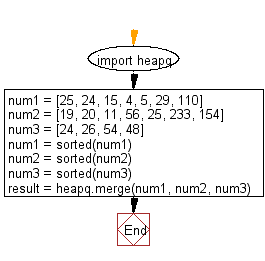Python: Merge multiple sorted inputs into a single sorted iterator (over the sorted values) using Heap queue algorithm
Python heap queue algorithm: Exercise-11 with Solution
Write a Python program to merge multiple sorted inputs into a single sorted iterator (over the sorted values) using Heap queue algorithm.
Sample Solution:
Python Code:
import heapq
num1 = [25, 24, 15, 4, 5, 29, 110]
num2 = [19, 20, 11, 56, 25, 233, 154]
num3 = [24, 26, 54, 48]
num1 = sorted(num1)
num2 = sorted(num2)
num3 = sorted(num3)
result = heapq.merge(num1, num2, num3)
print(list(result))
Sample Output:
[4, 5, 11, 15, 19, 20, 24, 24, 25, 25, 26, 29, 48, 54, 56, 110, 154, 233]
Flowchart:
Visualize Python code execution:
The following tool visualize what the computer is doing step-by-step as it executes the said program:
Python Code Editor:
Have another way to solve this solution? Contribute your code (and comments) through Disqus.
Previous: Write a Python program to get the n expensive and cheap price items from a given dataset using Heap queue algorithm.
Next: Given a n x n matrix where each of the rows and columns are sorted in ascending order, write a Python program to find the kth smallest element in the matrix.
What is the difficulty level of this exercise?
Test your Python skills with w3resource's quiz
Python: Tips of the Day
Returns True if all the values in a list are unique, False otherwise.
Example:
def tips_allunique(lst): return len(lst) == len(set(lst)) x = [1, 2, 3, 4, 5, 6, 7] y = [1, 2, 3, 3, 4, 5, 6] print(tips_allunique(x)) print(tips_allunique(y))
Output:
True False
- New Content published on w3resource:
- Scala Programming Exercises, Practice, Solution
- Python Itertools exercises
- Python Numpy exercises
- Python GeoPy Package exercises
- Python Pandas exercises
- Python nltk exercises
- Python BeautifulSoup exercises
- Form Template
- Composer - PHP Package Manager
- PHPUnit - PHP Testing
- Laravel - PHP Framework
- Angular - JavaScript Framework
- React - JavaScript Library
- Vue - JavaScript Framework
- Jest - JavaScript Testing Framework

